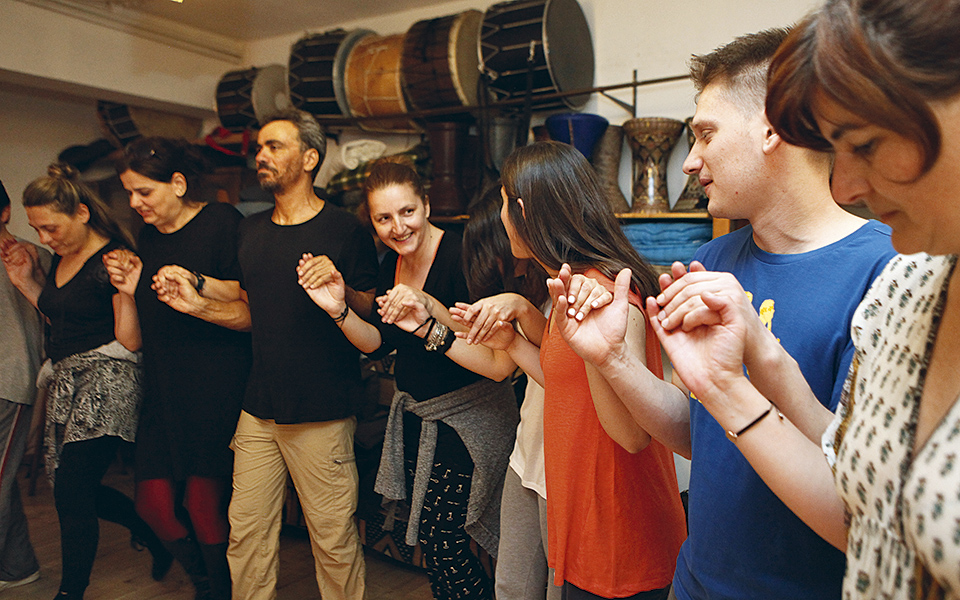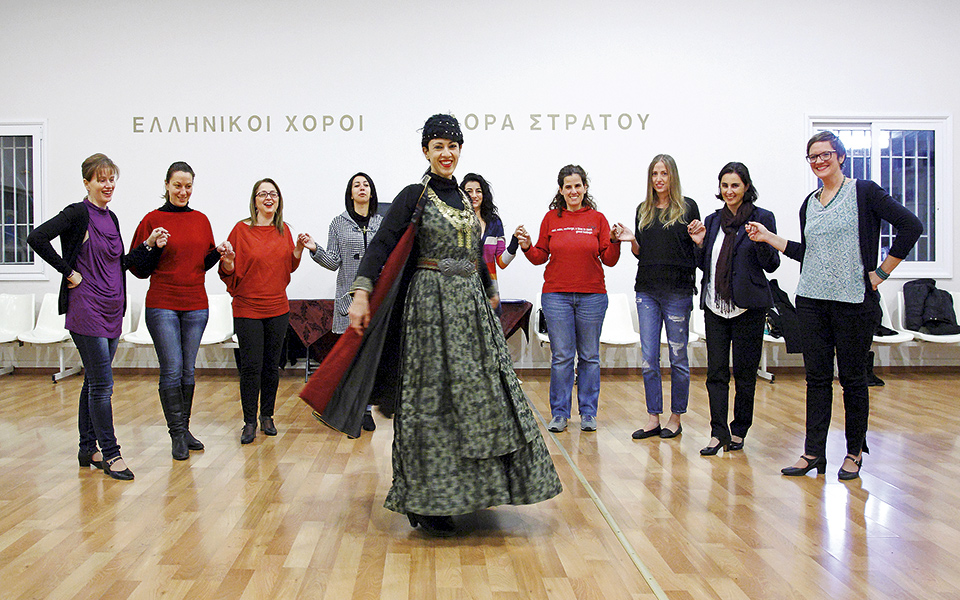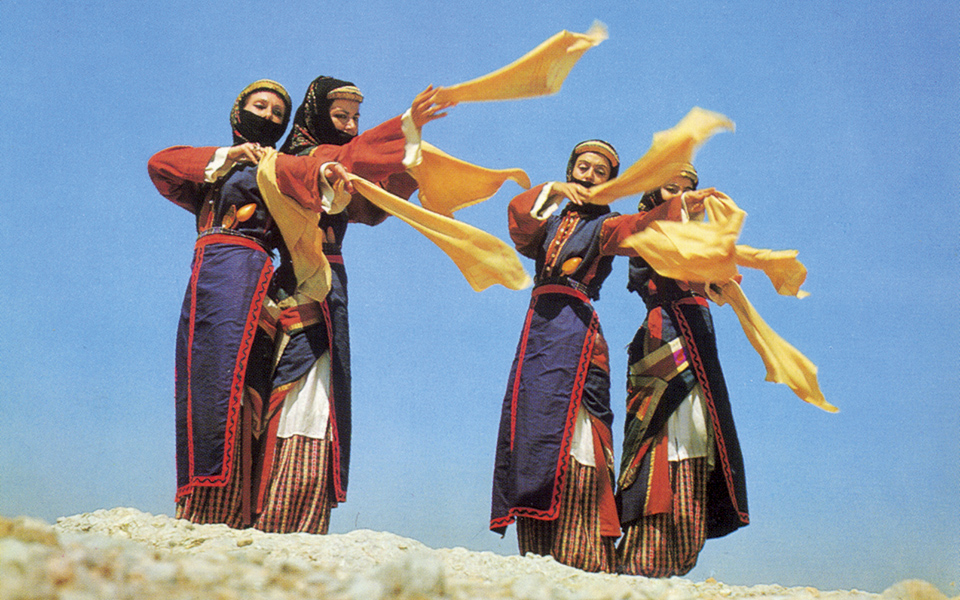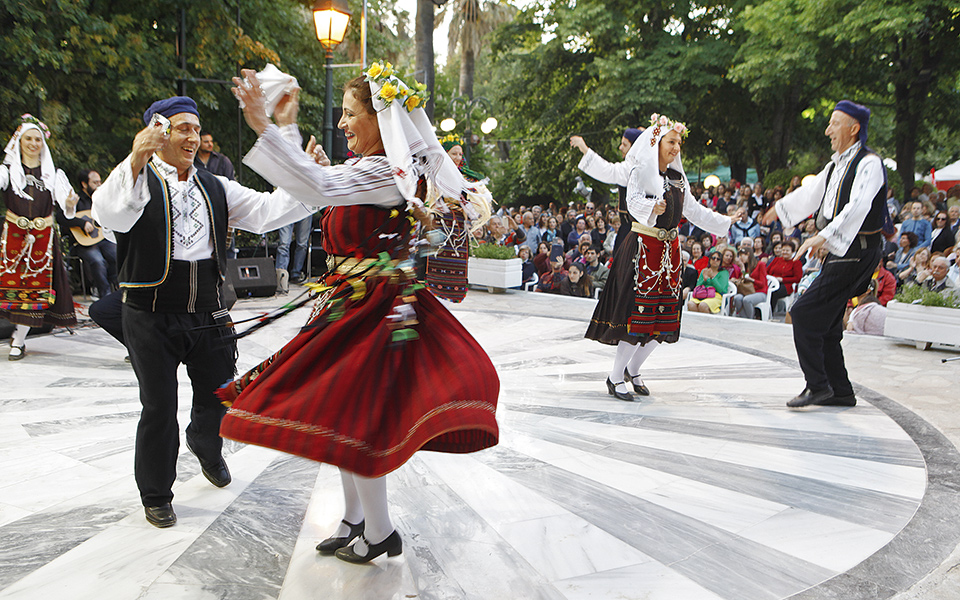“Teach me to dance, will you?” Basil asks Zorba. Towards the end of the film Zorba the Greek, after the uptight and English-bred Basil’s dreams of running a lignite mine on his father’s land have been crushed, after he has stood by in helpless inaction as his lover’s throat is cut in front of his eyes, he decides to try this dancing thing that seems to so affect his friend. Zorba, who has been mulling over his own disasters, jumps up, throws off his jacket, and begins to teach Basil the steps of a version of the Greek folk dance “hasapiko,” the now-famous “sirtaki.”
The film ends with the two men cackling and dancing joyously through their pain on a deserted Cretan beach. After all, as Zorba has already said earlier in the film, “When a man is full, what can he do? Burst?” No, he dances.
Several decades later, the words of Zorba continue to hold true on the third floor of a dingy apartment building in the busy Metaxourgeio area of Athens.
Against a backdrop of African drums and a map of West Africa (the dance classes take place at a percussion school), dance tutors Panayiotis Petropoulos and Katerina Kikaki of Antipatima teach Greek folk dances to a varied group of thirty and forty-somethings. The lesson structure is loose. Students trickle in between 19:30 and 21:00, joining in some dances, sitting out others. One student brings in two liters of homemade wine and cheese pies for his name day; a break is called, and people crowd the small waiting area, drinking and chatting before going back to the lesson.

© Katerina Kampiti
Growing up, Panayiotis (now 36 years old) never listened to Greek music of any kind – he was a bass player in a punk rock band. When he lost his IT job during the crisis, he felt lost and depressed, until one summer he found himself on the island of Ikaria, famous for its boisterous local festivals and the lively local dance named for the island.
The “Ikariotikos” is a tactile dance, where hands are not held, but slung over the next person’s shoulders, regardless of height, and a tight coil of bodies is created, spiralling ever outwards. Sometimes, hundreds of people can make up one coil. Panayiotis says the feeling that came from participating in circular dances worked as a form of psychotherapy for him and brought him out of his funk.
Wanting to share that feeling with others, he and his friend Katerina, a 28-year old PhD student of oceanography, formed the group Antipatima, which literally means “stepping the opposite way,” in October 2016. Unlike other traditional folk dance schools, the purpose of the classes at Antipatima isn’t flawless execution of the steps; instead, it’s to have fun. Nor is the point to make money: there’s a fee of just €4 per class, or €14 per month, but that is, they say, just a suggestion. The point is to find joy.

© Katerina Kampiti
“These are dance classes for our generation,” says Panayiotis. “There’s definitely been a turn towards tradition, people want to rediscover their culture. There’s a sort of ‘lost generation’ feeling; our grandparents danced folk dances much more often than our parents did.” Decades ago, there was a reaction against traditional folk dances, but that “now people are returning to their roots.”
I ask him whether this search for the traditional, for roots, has something to do with Greece’s financial crisis. “Maybe,” he says, “it’s because we don’t have the money to go on trips abroad anymore, so we’re forced to travel within Greece and discover our own country.”
At the more traditional end of the dance school spectrum lies the Zisis Foundation. Formed in 1972 by lawyer and Byzantine music aficionado Petros Zisis, its aim was to preserve and promote traditional Greek music. It offers lessons in traditional Greek instruments and folk dance classes for both children and adults at a number of locations in Athens.
Zisis holds the requisite dance productions with traditional costumes at the end of the year – using more than 1,500 complete costumes – and its students take part in municipal functions, like Greek Independence or May Day celebrations. The school has seen a marked rise in the number of people signing up, and is constantly adding new classes. Nikos Thomas, a teacher at the Zisis Foundation, says the recent spike in interest has coincided with an increase in research and discovery of so-called “new” dances.

“There used to be only one ‘kalamatiano,’ one ‘tsamiko.’ Now we accept that there are about 100 different tsamika, all performed in their own unique way,” says Nikos, who’s been teaching folk dancing for 33 years.
He goes on to explain how a village’s geography and climate heavily influences how its people dance. “For example,” Nikos says, “take Epirus, a poor, mountainous region in northwestern Greece. It is cold, the ground is hard and rocky, and so the dancers’ center of gravity is low and their moves are much slower and more deliberate than the ‘sirto’ of the islands, which is performed at a brisk and airy pace.”
In the 1970s, when Nikos came to Athens as a youth from Preveza in Epirus, the capital was flush with discos playing music from abroad or foreign-influenced Greek pop. Folk music was mainly for tourists, who were regaled with the showiest of dances. Now, he says, “There has been a turn toward anything that is traditional.”
Satisfying all this newfound interest in folk dancing would have been impossible had it not been for the determination of professional and amateur researchers who attended local festivals, documenting oral history and observing village elders. Perhaps no one has made a greater impact on the preservation of this tradition than Dora Stratou, a self-taught dance scholar who founded the “Dora Stratou Greek Dances Society” in 1953. By the end of her 30-year tenure, she had not only created a sanctuary to preserve traditional dance, but also built an 860-seat theater in central Athens and collected around 2,500 complete traditional costumes from all over Greece.
The school is still running well and classes are more formally structured than at other folk dancing schools. The approximately 600 students need to complete a three-year course in order to get a diploma. The best are invited to join the 75-member troupe. Current Dora Stratou president, 74-year-old Alkis Raftis, says that even though there was a dip in applications during the crisis most still attend. One student continues coming and paying the €30 a month even after losing his job, telling his teachers that he couldn’t live without dance.

Raftis, an academic who has published more than 20 books on Greek folk dance, says that folk songs have historically served as a consolation during difficult times. During the German occupation in World War II, people danced and sang so much that traditional Greek music was bolstered.
Back at the Antipatima dance classes, it’s carnival time. Panayiotis and Katerina pass out sheets of paper printed with the lewd lyrics of a carnival song from the island of Lesbos. “Don’t dance the steps, dance the music,” instructs Panayiotis. The group practices once, twice and then they’re off, singing and laughing and correcting steps. The session ends with an “Ikariotiko.” Fotini, a student, says she always loved folk dances. “I constantly wondered why it was never popular. When we had house parties when I was younger, in between the R&B songs I’d sneak in a ‘ballos’, and I’d be dancing by myself. Now, I’m no longer by myself.”
INFO
Dora Stratou Dance Theatre: Tel. (+30) 210.921.4650 • www.grdance.org/en • Performances are held daily from May 24 to September 24, and usually end in standing ovations
ZISIS FOUNDATION : 5 Kolokotroni, Chalandri • Tel. (+30-210-6815685.
about The Folk Dance Savior – DORA STRATOU (1903-1988)
Dora Stratou was born in 1903 into a privileged family and led a comfortable life until her father, Nikolaos Stratos, was accused of treason and executed, after serving as Prime Minister of Greece for just six days in 1922.
Dora left Greece after her father’s execution and the loss of her family’s fortune, living in Berlin, Paris and New York and studying classical music. She returned to Greece in 1932 and threw herself into theatrical and philanthropic endeavours, most notably helping Karolos Koun (the Greek theater director known for staging ancient Greek plays) set up his Art Theater.
Stratou’s life changed in 1952, when she saw a Yugoslavian folk troupe perform their country’s traditional dances in authentic costumes and realized that nothing of the kind existed in Greece. In 1953, with the help of both academics and the Greek government, she founded a dance company with the aim of creating a permanent dance troupe able to perform a wide repertoire of Greek folk dances.
Stratou singlemindedly pursued her goal of reviving folk dance, believing that its preservation would serve as proof of the continuity of the Greeks through the ages. Stratou herself went to villages and local festivals to learn as many forms of traditional dance as she could, while also acquiring the thousands of priceless original costumes still used in performances today.
In 1963, construction began on the open-air theatre on Philopappou Hill after a special order by then-Prime Minister Konstantinos Karamanlis. Stratou retired in 1983, having written three books on Greek dance and released 45 folk music records.












